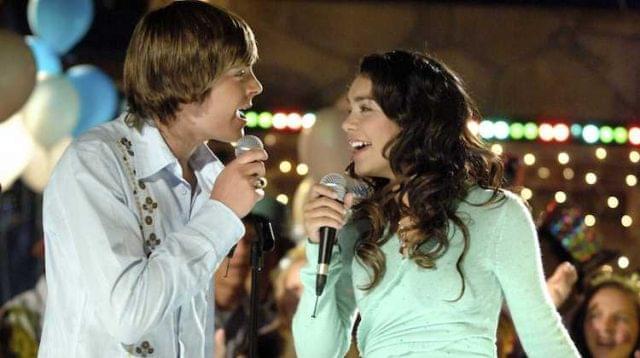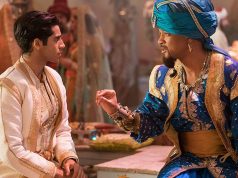
The Walt Disney Company is unparalleled in its production of inexpensive, medium-quality films that appeal to its two major target audiences: the young, and the easily amused. Many of these films are released in theaters and frequently involve someone like The Rock getting bitten by something like a duck. But Disney also makes dozens of movies for its own cable network, The Disney Channel, where the expectations are even lower. When people pay for a movie ticket, they demand excellence or, at the very least, fart jokes. When it’s coming into their homes basically for free on The Disney Channel, all they expect is that the movie be in color.
Considering how little effort is put into these Disney Channel movies (very little), and how many of them are produced per year (75,000), you can see why it was a surprise when “High School Musical” became a smash hit. Why did fate smile so favorably upon this movie while the rest of the Disney Channel’s offerings faded into obscurity? Why didn’t “Life Is Ruff” (2005), about a boy who enters a mutt in a dog show in the hopes of winning enough money to buy a rare comic book, become a worldwide sensation? Why are there not millions of teenage girls screaming their lungs out in response to “Cow Belles” (2006), in which a pair of rich, spoiled sisters have to work on a dairy farm?
Disney scientists labored for months analyzing “High School Musical,” dissecting it, running laboratory tests on it, trying to determine what made it, as opposed to its siblings, so popular. If they knew what the key factor was, they could reproduce it and create an infinite number of equally successful Disney Channel Movies! But they couldn’t isolate this elusive strand of DNA (known in scientific circles as the OMGene), so instead they gave up and just started making sequels.
(These Disney Channel movies are often filmed in Utah, by the way, a state that is attractive to Disney because it offers low production costs, beautiful scenery, and a vast supply of clean-shaven white people to use as extras. I lived in Utah for many years and know several people who have worked on the Disney films shot there, both in front of and behind the camera. All of them say the same thing about the experience from a creative standpoint: you get paid on time, and the checks don’t bounce.)
“High School Musical” begins at a New Year’s Eve karaoke party at a ski lodge, where two teenagers who don’t know each other are forced to sing a song together. One of the kids has soft, translucent skin and pretty eyes; the other one is a girl. Troy (Zac Efron) has never sung before. Gabriella (Vanessa Anne Hudgens) has sung with her church choir but is terrified of performing solo, possibly because her 5-year-old little-girl speaking voice becomes even whinier and more nasal when she sings. The two of them are urged onstage by the karaoke DJ — compelled, really, in a cruel enforcement of draconian karaoke laws — and listen as the first few bars of a song they’ve never heard before play out. The lyrics appear on the screen, and they belt out the tune as if they’d rehearsed it for months, complete with harmonies, overproduced studio-quality vocals, “oohs” and “yeahs” at appropriate intervals, and that breathy vocal styling that is popular on “American Idol” and top 40 radio and has no connection to actual vocal ability. The viewer settles in for 95 minutes of this.
Vacation ends and school starts up, and it turns out that Gabriella, in a “Grease”-like twist, has just moved to Troy’s school: East High, in Albuquerque, N.M. Troy is the most popular boy on campus and the undisputed star of the champion varsity basketball team. (The fact that their star player is a 5’9″ junior who looks like a cast member of “Gossip Girl” probably says a lot about the competition in the Albuquerque region.) Gabriella asks if he’s going to try out for the school musical, but he says no, the singing on New Year’s Eve was a one-time thing, just experimenting, really, it’s not who he is, not that there’s anything wrong with that, it’s just not for him. Please don’t ever bring it up again. He’s worried about what his teammates will think if they know he sings. What, because they’re all so butch?
During basketball practice, Troy sings a song about his latent musicalism and his attraction to Gabriella. The song has lyrics that are innocuous if they apply to basketball but unspeakably filthy if they do not. For example: “Take the ball to the hole” and “don’t be afraid to shoot the outside J.” (Actually, I don’t know what that second one means in either context.)
The other problem with auditioning for the musical with Gabriella is that it would put them in competition with the couple who usually dominate in this field, the wealthy, snobby drama queen Sharpay (Ashley Tisdale) and her twin brother Ryan (Lucas Grabeel). (The fact that so far no one has questioned the wisdom in the school plays’ romantic leads being performed by a brother and sister probably says a lot about how they do things down there in New Mexico.) Sharpay and Ryan are the villains of the movie, as well as the only characters who are legitimately funny or interesting. “High School Musical” thus suffers from the same ailment as “Masters of the Universe,” and I’m not saying that just so I can be the first person to mention those films in the same sentence.
Troy and Gabriella wind up auditioning anyway, sort of, accidentally, and they happen to perform an intricately produced duet of a song they’ve never heard before, just like on New Year’s Eve. This is evidently a skill of theirs. And once word of the audition gets around, the school is abuzz! A new girl and a jock taking on the fearsome Sharpay/Ryan theatrical incest juggernaut? What further miraculous wonders await us?! In the cafeteria, there is a large-scale production number in which various students, emboldened by Troy’s admission that he likes singing, confess their own secret passions. An athlete loves to bake. A chubby white girl likes hip-hop. A skater dude plays the cello. Naturally, you start making up your own scandalous revelations that would be really funny for the movie to include. “I’m a peeping Tom!” you hope someone will declare. Or: “I had a baby last year!” Why wasn’t I consulted when this film was written?
Troy’s new interests are decried by his best friend and teammate, Chad (Corbin Bleu), whose hair makes him look like Justin Guarini. (Think how sad it must be for Justin Guarini to know that if it weren’t for his hairstyle, no one would ever mention him at all.) There’s an important game coming up, and Chad fears Troy will be distracted by these extra extra-curricular activities. Chad is matched in his immature overreaction by Troy’s father (Bart Johnson), who is also the coach. He, too, is upset to learn that Troy is auditioning for the musical. But who can blame him? No father wants to hear that his son is thinking of forsaking sweaty physical activity with athletic, scantily clad boys in favor of enacting romantic scenes with girls in front of audiences.
Meanwhile, the school’s nerd clique doesn’t want Gabriella distracted from the upcoming academic decathlon (yes, despite all evidence to the contrary, Gabriella is a whiz kid). So the nerds and the jocks conspire to break Troy and Gabriella up. Then, since this is a simple-minded Disney film, they immediately feel guilty and confess to the pair, who happily reconcile, having been split up just long enough for Zac Efron to sing (well, for his vocal double to sing) a fiery I-miss-you song.
Back to the real villains. Sharpay and Ryan get the date of the audition callbacks moved so that it coincides with both the basketball playoff game AND the academic decathlon, which means Troy and Gabriella won’t be able to come to the auditions, which means a counter-scheme is required, and you may rest assured that they DO make it to callbacks, and their performance is incredible, and they get the parts in the play. Consider it an act of great mercy that the movie ends here, with Troy and Gabriella being cast in the show, rather than actually making us watch the show.
This sounds like a happy ending, but wait. What about Sharpay and Ryan? Now they’ll be stuck with supporting roles in the school musical! Sure, they were the villains, and sure, they completely deserve the negative consequences of their actions. But a simple-minded Disney film cannot leave anyone unhappy, no matter how much they deserve it. So in the final scene, Sharpay tells Gabriella that she’s not upset and she’s happy for her. Even though getting the lead in the musical was her No. 1 priority for the entire film, now she suddenly doesn’t care anymore after all. Brilliant! Way to write yourself out of a corner there, “High School Musical”! When you can’t figure out a proper motivation for a character’s change of heart, just give ’em the change of heart anyway!
It’s easy to see why this film and its sequel have been so popular with children and the mentally enfeebled. Its stars are shiny-faced young people with broad smiles who speak in short, uncomplicated sentences. It teaches a positive message about not being embarrassed about your interests, provided those interests fall within certain uncontroversial, socially acceptable parameters. One or two of the songs are tolerable. And, best of all, it’s in color.
— Film.com





